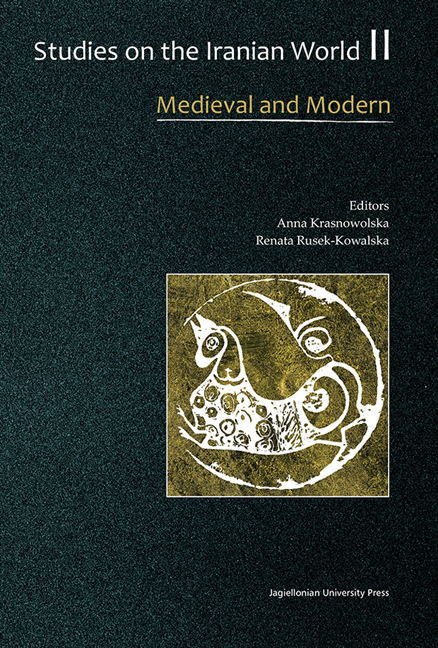Book contents
- Frontmatter
- Contents
- Foreword
- Linguistics
- Literature
- Religion
- Shibboleths of Heresies: on Some Essential Markers of the Near Eastern Non-Dogmatic Milieu
- Female Religious Practitioners in the Context of Contemporary Transformations of Islam in Tajikistan
- The Key Content of Contemporary Zoroastrian Identity in the Islamic Republic of Iran: a Socio-Anthropological Approach
- History
- Arts
- Social and Cultural Studies
The Key Content of Contemporary Zoroastrian Identity in the Islamic Republic of Iran: a Socio-Anthropological Approach
from Religion
Published online by Cambridge University Press: 12 January 2018
- Frontmatter
- Contents
- Foreword
- Linguistics
- Literature
- Religion
- Shibboleths of Heresies: on Some Essential Markers of the Near Eastern Non-Dogmatic Milieu
- Female Religious Practitioners in the Context of Contemporary Transformations of Islam in Tajikistan
- The Key Content of Contemporary Zoroastrian Identity in the Islamic Republic of Iran: a Socio-Anthropological Approach
- History
- Arts
- Social and Cultural Studies
Summary
SUMMARY
In this article the author pays attention to the concept of contemporary Zoroastrian collective identity that is constructed by the social leaders of the community in the Islamic Republic of Iran. The reflection on the identity of the Zoroastrian religious minority in contemporary Iran is based on the author's field research conducted in Tehran in 2008. The analysis is based both on ethnographic interviews and on Zoroastrian publications. Firstly, the author briefly comments on the theory of collective identity used in the analysis, then introduces the Zoroastrian community of Tehran. The main part of the article is focused on the issue of collective identity construction among the contemporary Zoroastrians as a minority group and the key elements of their identity.
INTRODUCTION
This reflection on the contemporary identity of the Zoroastrian religious minority of Iran is based on the analysis of both ethnographic interviews and contemporary Zoroastrian publications, collected during field research in Tehran in 2008. Collective identity, as it is understood in this analysis, is not naturally generated but socially constructed. Boundaries between ‘us’ and ‘them’, and social collectivities require the construction of equality among the insiders, based on values, symbols and recollections. This takes place in several types of situations, in different rituals and ceremonies, and through various agencies of socialisation, educational institutions, mass media or religious preaching. These situations are crucial for the attachment of members of a collectivity to its symbols and boundaries. The construction of collective identities is effected by various social actors, particularly by social leaders and elites in interactions with broader social sectors of the community. When the leaders’ ideas find resonance among them, they are able to institutionalise the distinct symbols and crystallise the boundaries between the community and outsiders, and collective identities (Eisenstadt 2009, pp. 140–142; Eisenstadt and Giesen 1995, p. 74).
Shmuel N. Eisenstadt and Bernhard Giesen recognise three major codes (schemata or themes) of the construction of collective identity (1995, pp. 74–84). These are codes of ‘primordiality’, ‘civility’ and ‘sacredness.’ They are seen as ideal types because in reality the coding is complex and usually involves elements of different codes.
- Type
- Chapter
- Information
- Studies on the Iranian WorldMedieval and Modern, pp. 149 - 156Publisher: Jagiellonian University PressPrint publication year: 2015



